I was thrown back into the spotlight the moment I got off the plane: the customs officers asked to take pictures before I had to walk out the double doors into the hot and humid “Arrivals” area. A dozen of cameras flashed and “RED” signs went on. A prickly jasmine necklace was placed around my neck and I was hushed to a corner of the airport café for the first of a series of press conferences. “How was America? Why are you back? What changed? What are your hopes for Cambodia? Who are you with? I smiled and responded very calmly. The same evening, while giving another conference, the images taken at the airport earlier appeared on every news TV channel in Cambodia - reportedly, 10 million viewers - and on all major websites and streaming outlet. I sat on the edge of my bed, staring at the latest text from my mother:
“ Try to get some sleep.”
And so I did.
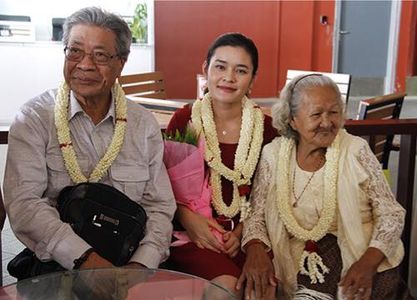
press photos from the airport; with Dr. Ung, Master dancer Em Theay, and Susan Ung (below)
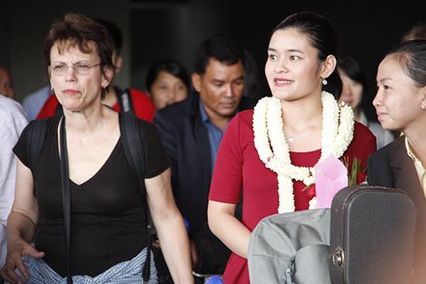
***
I get very uncomfortable when talking about how I grew up.
It’s not easy to explain to friends and colleagues, even teachers the how and why to the what as to my upbringing as an artist and child celebrity.The two of them go as a pair. Without the large network of musicians, producers, sound engineers, dancers, and artists - cumulated over the past ten years or so -I simply wouldn’t have grown into the mature composer that I am today. Yet, I still feel hesitant to address all the nitty gritty of child stardom in Cambodia. Nobody can relate to that.I hate sounding pretentious and unappreciative, but the facts are the facts: I appeared on TV on a sunday talent show, people got very interested, I had a makeup artist on call, all outfits were tailor-made and I made my magazine cover at the age of 8. I didn’t chose to be like this - circumstances made it so that people saw something and were extremely interested in me. My parents were very supportive, and tried to give me the best balanced life possible while choosing the right opportunities to make me grow as a (very) young artist. You don’t chose this life when you’re eight, it is given to you. I just wanted to be an archeologist then and asking myself why jasmine flowers had to wither so quickly after they bloomed.
***
After arriving in Phnom Penh, the Nirmita Team and I traveled to Siem Reap where we were to spend the next two weeks. I enjoyed (re)visiting the temples of Angkor, away from the press but not without being recognized or pointed at with somebody mouthing my name. Another press conference was given right our opening ceremony at Wat Bo; throughout the program, PR from Cambodian Living Arts took videos and recordings and I was preparing for a benefit recital to support the Angkor Hospital for Children (AHC). The fundraiser was a success, a lot of people came including the Governor of the Province,fashion designer Eric Raisina, founder of Gelato Lab Edoardo Todaro (whom I met a few days earlier) and the Ladies of the Cambodian Women Entrepreneurs Association amongst others guests. It was set at Malis Restaurant Siem Reap, and the reception hosted by long time collaborator and family friend, Chef Luu Meng. I had the opportunity to visit AHC a few days later and was deeply touched by the work they do there.
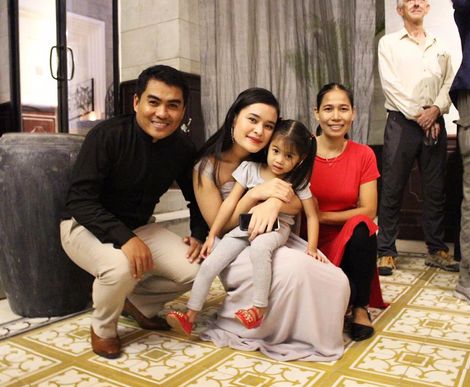
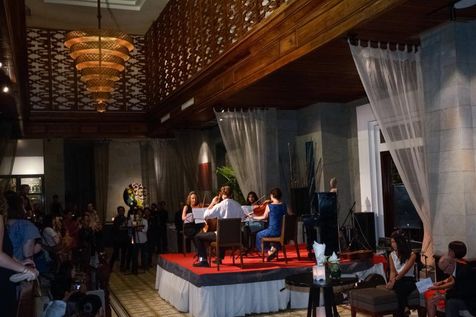
members of Nirmita perform at the fundraiser
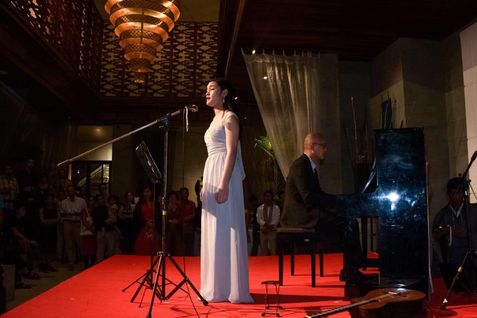
with guest artist, Pang Vongtadaron (Thailand) on piano

with founder of Gelato Lab, Edoardo Todaro

with the Cambodian Women Entrepreneurs Association
I wished I had a bit more time to do nothing - but I was only in Cambodia for a month and it was crucial to do as much as possible.I barely had any rest, until I was hospitalized for a severe allergic reaction a few days after the workshop. I was on my way to the village of Bac Prear in Battambang to visit the community there, to whom I had donated a few years ago water filters to reduce the number of dysentery deaths and infections.
The rise of social media, access to smart phones and internet in Cambodia makes it so one can have a huge impact on society - and society can judge you very cruelly if you hit the wrong note. Though I believe the country is becoming more progressive and there are many open conversation about the portrayal of women in the arts, Cambodian remains in some aspects a conservative country. Art, in any form, is seeing as sacred and a great part of it associated with religion and culture - and so, with rigid gender norms and dress code. This is mostly pertinent when you are dealing in the field of traditional arts and intellectual property - essentially the core material of my work with the Nirmita Composers Institute. I’m glad to see such strong women leading the pop music scene in Cambodia: Laura Mam, Nikki Nikki, Ouk Sokunkanha. I think this will open more conversations about art and the portrayal of women in the arts. There are more women in the spotlight than before, and the rise of femininity is comforting.

with the CEO of AHC, Dr. Claudia Turner
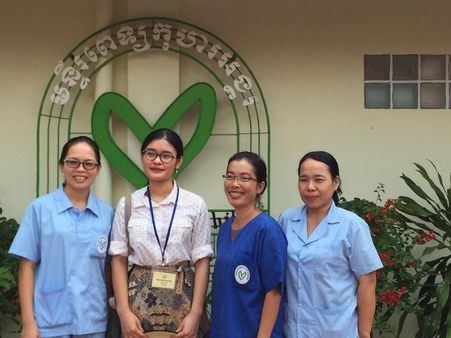
with AHC staff, to preserve patient's privacy, we were not allowed to take pictures inside AHC
***
When I moved to the United States in 2012, I found a new freedom, a gush of fresh air.I had gone to the same school in Cambodia (a K through 12 private French school) and as a consequence, all my friends had seen me catapulted into fame. I was already a pretty awkward and shy child, and very few friends didn’t turn their backs on me. Middle school was pretty tough, between puberty and the incessant teasing. It was bullying, but there wasn’t any concept of bullying in French schools. I don’t think my classmates even knew that their actions were considered bullying. The only way I could fight back was to just get even better at what I knew I was good at, and get the best grades in all subjects. I didn’t help stop the teasing, but it was the only way I could still have some sort of respect.
I didn’t open right away about who I was. I was fresh off the boat from a third world country, and my knowledge of music theory, solfege and classical music was limited. I didn’t have the privilege of easy access to the arts- I felt very behind. I worked twice as hard, and slept thrice as less. I eventually caught up with the level of my peers over the past five years, but there are still many things I cannot relate to. I grew up very isolated.
***
I looked at uncle Rithy as we sat in his work room. Rithy Panh is a filmmaker who was nominated for Best Foreign Film at the Academy Awards, he has six prizes and nominations from the Cannes Festival and a list of other achievements but to me, uncle Rithy is the man who took me fishing outside of Phnom Penh when I was just a child. I knew I was at a very important part of my life as an artist (the learning process) and I asked for his advice as to what I should be doing in the coming years.
“ Go out, visit museums, read. You can only create good art when you have a content life”
I agreed. We hadn’t seen each other in a few years, but he looked the same. I spoke to him about how great it was to collaborate with different musicians, and my love for prose. I also spoke to him about stepping out of the press and media. We agreed that the switch will be different from being a performer to becoming a writer: less emphasis on what you look like, less paparazzis, more time to cultivate yourself. He emphasized the importance of privacy, a concept almost foreign to me growing up, and the importance of letting your art speak for you. Press and Media should be the reward, not what you seek. Another thing we agreed on is that you absolutely cannot be pretentious when you art relies on collaborative effort. One of my golden rules is the following: When it comes to work, leave your ego at the door. The other one is : you have to draw a line between personal and work, to protect their respective integrity.
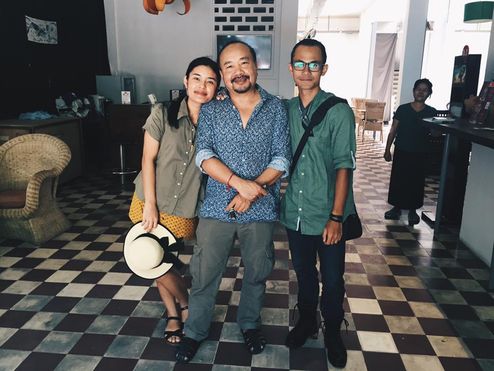
with uncle Rithy and SIbxy
I was reading an article in Monocle Magazine, “ When does making a difference mean more than money?”. Several start-ups were used as examples on how their business blossomed and how they were giving back to the community, either through monetary funds or socio-psychological impact.Uncle Rithy’s documentaries have had a tremendous impact on the world, educating about the Khmers Rouges Genocide, portraying the inhumane with the pinnacle of what is is to be humane: art. I remember very vividly his film the Burnt Theatre. I remember even more vividly when the Preah Suramarit National Theatre (build by Vann Molyvann was demolished in 2008. I was 11, and I remember it because Uncle Rithy’s film was set there.
My last day in Phnom Penh was the busiest. I started with a visit to the US Embassy with a small performance for the Embassy Staff and my afternoon was taken by a photoshoot and interview for Ladies Magazine at the Raffles Royal Hotel. I wished I had more time to go and visit all my childhood places, but I had only had a few hours with all of it. I left Cambodia with a heavy heart, wishing I had seen everybody I wanted to see, and had more time catching up with loved ones. Until next time - but when?

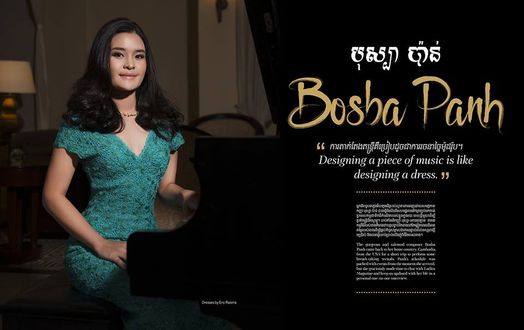
Ladies Magazine
***
By taking a step back from the scene, I was catching up with growing up at my own pace, absorbing a new culture and new knowledge (America), getting closer to my family. I became more extraverted after taking theatre classes,and it was easier to express my feelings. I got closer to my family. Though I am thankful for my years as a singer, I need to move on and go on to other things. I’m thankful for my years under the spotlight for shaping me into the artist that I am today and for setting the grounds for a new kind of art medium and new kind of communication. I am thankful for the fans, the friends and colleagues that have been here with me since the beginning. As a composer, I have a lot to discover and to experience. While it may sound like I am “retiring”, I really am not. I am twice as active as an artist, but twice as less in the spotlight. As for now, I must explore what lies ahead of me.
